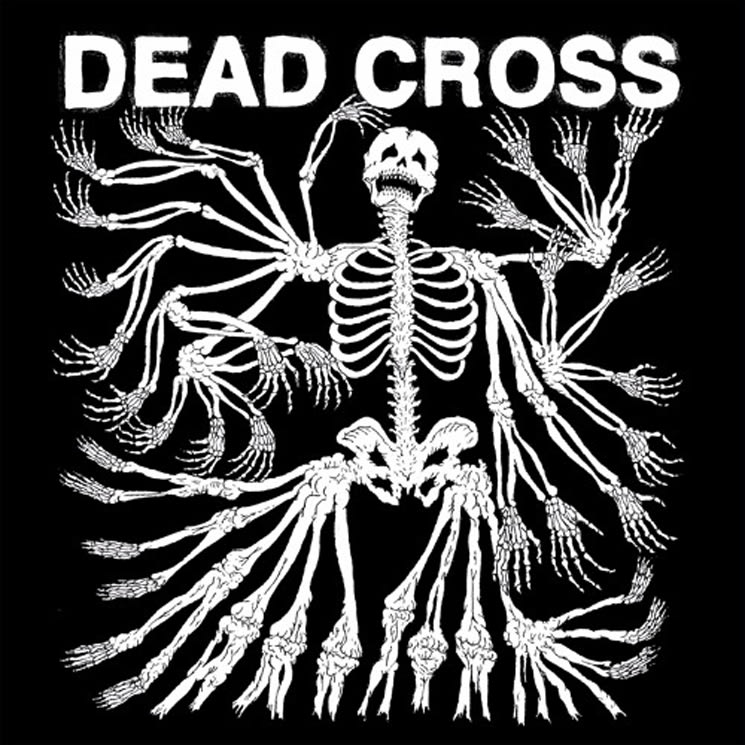Supergroups are often hyped up by fans of the collaborators' main bands, leading to disappointments such as Lou Reed and Metallica's collaborative disaster, or the boring team-up of Dave Grohl, Josh Homme and John Paul Jones in Them Crooked Vultures. Dead Cross, on the other hand, blow all expectations out of the water on their aggressive and unique self-titled debut.
Consisting of members of the Locust, Retox, ex-Slayer drummer Dave Lombardo and Faith No More mastermind Mike Patton, the idea of the band alone had built massive anticipation before any music had even been released: Fans were won, tours were booked and studio time was scheduled. Luckily enough, the people who gave the band early approval were met with one of the best hardcore punk albums to come out in years.
The band's sound falls somewhere along the lines of old school hardcore bands like Dead Kennedys or Bad Brains, while creating an entirely unique tone that plays off of the strengths of their members. Patton's signature strange voice is put on full display on songs such as "Grave Slave" or "Shillelagh" as he belts out harsh, manic shrieks intertwined with operatic backing vocals. The vocalist's approach comes across like a revisit to his days collaborating with the Dillinger Escape Plan, but with a more direct and vicious attack.
Powerhouse drummer Lombardo kicks every single song on the album into high gear. His frenetic double-kicks propel tracks like "Idiopathic" or "Obedience School," while locking in tight grooves for the few fleeting moments where Dead Cross slow the pace. The record's most diverse moment comes with the band's cover of Bauhaus's "Bela Lugosi's Dead," a dark and eerie track that deviates from the band's sonic assault and slows the pace before they launch back into another round of rampage.
While a lot of discussion about Dead Cross has revolved around Patton and Lombardo, given their status in the music industry, bassist Justin Pearson and guitarist Michael Crain provide a steady foundation of sadistic and visceral guitar work on the record. Crain's chaotic soloing and thin, metallic tone gives the album a classic punk sound that you hear on early Suicidal Tendencies albums, while Pearson brings his characteristically thick bass tones to fill in the gaps.
The term 'punk' has been wildly abused and hardly holds any real meaning at this point, but if anyone is able to reclaim the term for the bands that began the music, it's Dead Cross. In just under a half-hour, the band tear apart any notion that punk music can no longer be inventive or groundbreaking; Dead Cross brings life back into the genre.
(Ipecac)Consisting of members of the Locust, Retox, ex-Slayer drummer Dave Lombardo and Faith No More mastermind Mike Patton, the idea of the band alone had built massive anticipation before any music had even been released: Fans were won, tours were booked and studio time was scheduled. Luckily enough, the people who gave the band early approval were met with one of the best hardcore punk albums to come out in years.
The band's sound falls somewhere along the lines of old school hardcore bands like Dead Kennedys or Bad Brains, while creating an entirely unique tone that plays off of the strengths of their members. Patton's signature strange voice is put on full display on songs such as "Grave Slave" or "Shillelagh" as he belts out harsh, manic shrieks intertwined with operatic backing vocals. The vocalist's approach comes across like a revisit to his days collaborating with the Dillinger Escape Plan, but with a more direct and vicious attack.
Powerhouse drummer Lombardo kicks every single song on the album into high gear. His frenetic double-kicks propel tracks like "Idiopathic" or "Obedience School," while locking in tight grooves for the few fleeting moments where Dead Cross slow the pace. The record's most diverse moment comes with the band's cover of Bauhaus's "Bela Lugosi's Dead," a dark and eerie track that deviates from the band's sonic assault and slows the pace before they launch back into another round of rampage.
While a lot of discussion about Dead Cross has revolved around Patton and Lombardo, given their status in the music industry, bassist Justin Pearson and guitarist Michael Crain provide a steady foundation of sadistic and visceral guitar work on the record. Crain's chaotic soloing and thin, metallic tone gives the album a classic punk sound that you hear on early Suicidal Tendencies albums, while Pearson brings his characteristically thick bass tones to fill in the gaps.
The term 'punk' has been wildly abused and hardly holds any real meaning at this point, but if anyone is able to reclaim the term for the bands that began the music, it's Dead Cross. In just under a half-hour, the band tear apart any notion that punk music can no longer be inventive or groundbreaking; Dead Cross brings life back into the genre.
